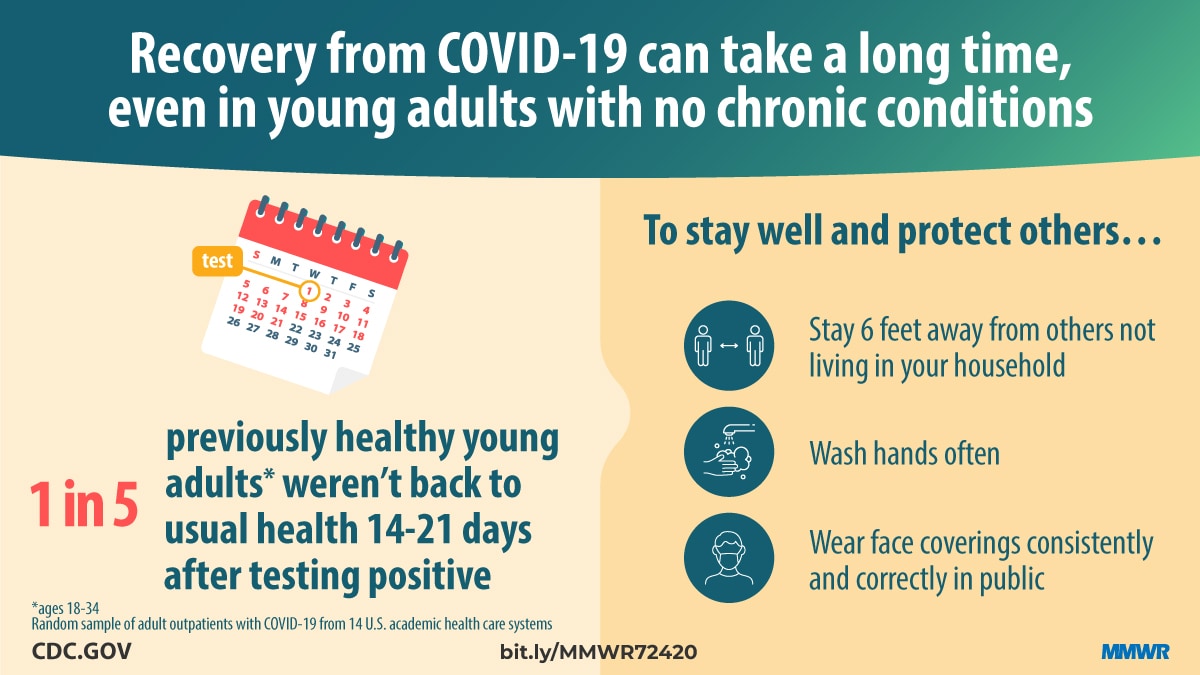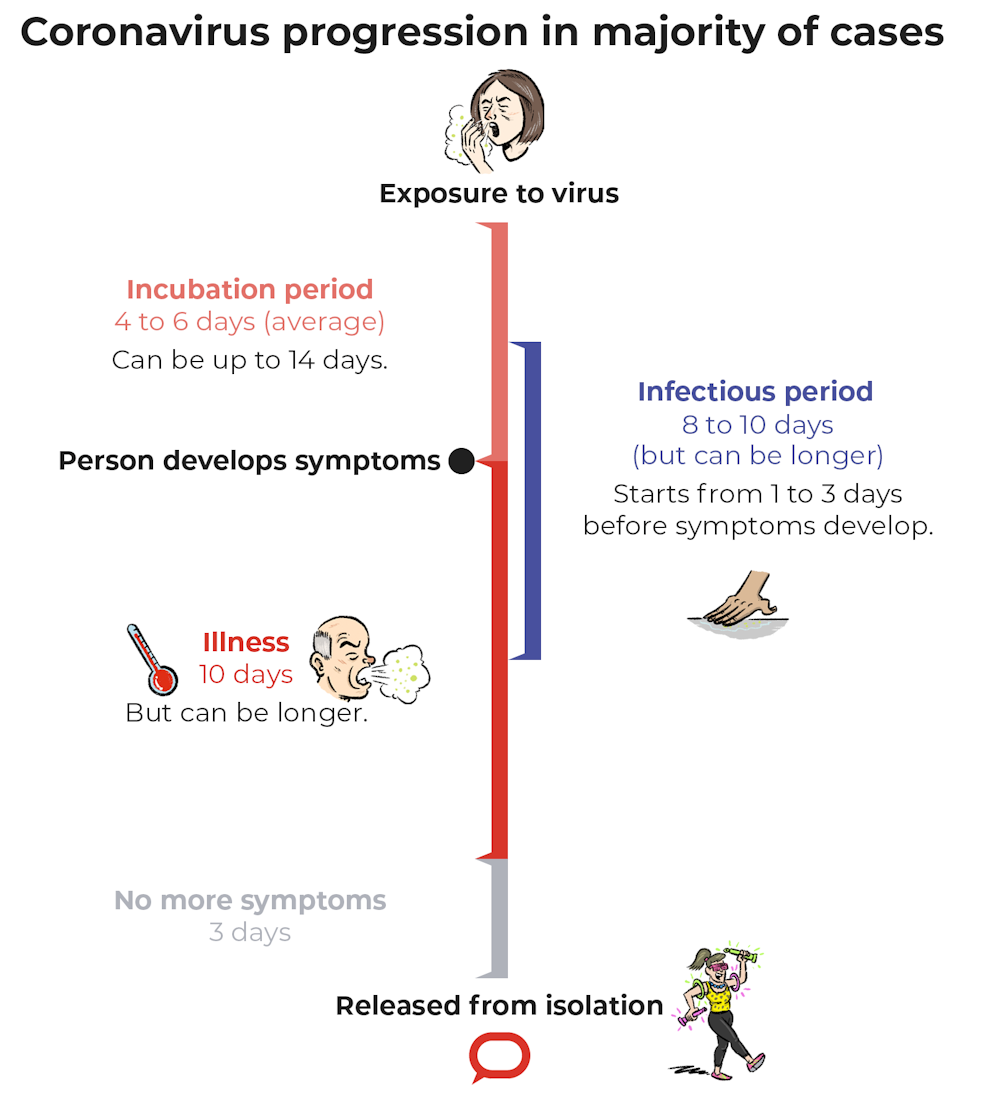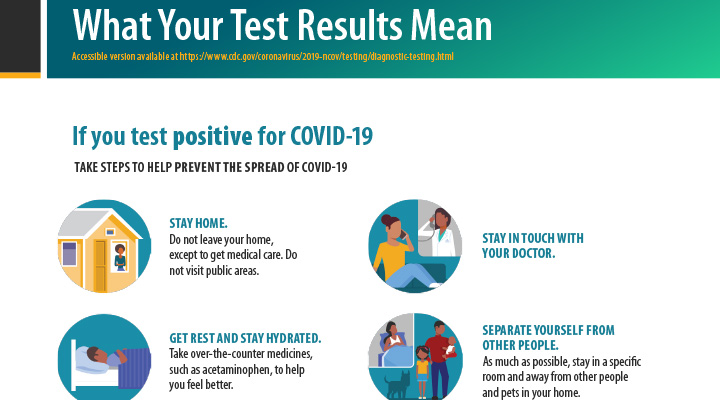Someone who tested positive for COVID-19 with a viral test within the previous 90 days and has subsequently recovered and remains without COVID-19 symptoms does not need to quarantine. This waiting period can help keep your reactions to the COVID-19 vaccine more mild.

Symptom Duration And Risk Factors For Delayed Return To Usual Health Among Outpatients With Covid 19 In A Multistate Health Care Systems Network United States March June 2020 Mmwr
How soon do I need to be tested again.

How long does covid 19 last if you test positive. For people who are infected but asymptomatic never develop symptoms isolation and precautions can be discontinued 10 days after the first positive test. Ive tested positive for COVID-19 infection. You also need to be fever-free for 24 hours.
The GP or CBAC staffer who took your original test will call or send you a. Other symptoms of COVID-19 are also improving or are gone. These results suggest that shedding may occur for longer than 2 weeks in some people with COVID-19.
In England if you do the PCR test within 2 days of a positive rapid lateral flow test at a test site and your PCR test is negative you can stop self-isolating. You are going to have to isolate just as though you were not vaccinated for 10 days from the first symptoms that you recognize or from. Once youve tested positive for the virus you do not need to be tested again for 90 days from symptom onset if you became ill or from the date of your positive test if you remained asymptomatic.
Get tested and isolate immediately if experiencing COVID-19 symptoms. The more severe the clinical presentation the longer the duration of positivity with a median of 31 days in a Chinese study involving 41 serious cases 9. If you tested positive without having symptoms you can be around others if its been 10 days since your positive test.
If you think or know you had COVID you need to stay away from other people for 10 days from the onset of symptoms. Being completely cleared wouldnt happen any sooner than 14 days though since the virus incubation period is two weeks. A July 2020 CDC report found that 35 of people who had mild cases of COVID-19 were not back to their usual state of health 1421 days after testing positive.
Get a COVID-19 vaccine. While you could test positive for COVID-19 as soon as two days after exposure false negatives are common early in the 14-day incubation period. Negative test results can take slightly longer.
Get tested 5-7 days after close contact with someone with suspected or confirmed COVID-19. Positive test results or tests for people deemed higher risk are prioritised and confirmed with patients typically within 24 to 48 hours. They typically recommend waiting about 90 days after youve recovered from the virus.
Among those aged 1834 years with. The duration for mild cases of COVID-19. If you have COVID-19 do not go to a vaccine appointment if you have one scheduled.
Now a new paper from the lab of Whitehead Institute Member and MIT professor of biology Rudolf Jaenisch may offer an answer to why some patients continue to test positive after recovery from COVID-19. A CDC report published in July found that 35 of people who tested positive and had symptoms said they had not reverted back to their. Signs that you need medical attention COVID-19.
For some people COVID-19 symptoms persist for several weeks. Wait until it has been 4 weeks since you tested positive. Patients who have recovered from COVID-19 can continue to have detectable SARS-CoV-2 RNA in upper respiratory specimens for up to 3 months after illness onset.
The CDC offers this rule of thumb. Phone HSELive on 1800 700 700 to get a new appointment date. A recent study showed that 16 of patients with Covid-19 continued to test positive for SARS-CoV-2 RNA up to 24 days after resolution of symptoms and discharge from the hospital.
Those who test positive but do not exhibit symptoms over the next 10 days are generally considered not contagious but there have been exceptions. Most patients diagnosed with COVID-19 stop being contagious within 10 days after their symptoms have completely resolved. Once youve recovered from acute illness and no longer have to isolate experts recommend that you get the COVID-19 vaccine.
In Wuhan 36378 95 of patients having tested positive remained positive 30 days later and in some cases their positivity lasted as long as 83 days. There are two ways you will get your COVID-19 test result back. Mild cases of COVID-19 are quite common.
Evidence suggests that testing tends to be less accurate within three days of exposure. If you are fully vaccinated you should wait three to five days after exposure before getting a test. After a supermarket worker in Sydney tested positive for coronavirus after spending time in quarantine and seemingly recovering from COVID-19 many are asking whether 14 days of quarantine is enough.
In addition some. If you do the PCR test later than this youll need to self-isolate for 10 full days even. However the study.
It can take almost a week after exposure to COVID-19 to have a positive test result. At 152 days the odds of continuing to shed the virus were less than 5. Your household does not need to self-isolate with you if you do not have symptoms of COVID-19 or have not received a positive PCR test result but.
Also RNAs generally have a short life most only stick around for a few minutes so it was unlikely for positive tests to be the result of residual RNAs. It also advises that anyone who tests positive for Covid should not be re-tested within 90 days of that test unless they develop any new symptoms of.

How Long Are You Infectious When You Have Coronavirus

What To Do If You Or A Loved One Tests Positive For Covid 19 Unicef India

What To Do If You Test Positive For Covid 19 Vermont Department Of Health



Tidak ada komentar:
Posting Komentar